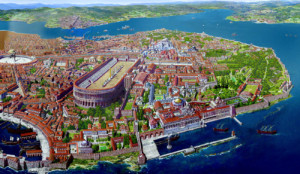Our Byzantine Heritage – A Proud Past!
The Byzantine Empire had its origin in the early 4th century when Constantine the Great moved Rome, which was then the capital of the Roman Empire, to a little-known Hellenic town of Byzantium. This town straddled the Straits of Bosporus, in today’s Turkey, and it marks the meeting point between Asia and Europe.
The view from the shore was unbelievably exotic, littered with numerous little beaches in the beautifully expansive Sea of Marmara on one end, and the Straits of Dardanelles at the other end. The site was strategic in controlling trade between the Mediterranean and the Black seas.
The Empire reigned for 11 centuries until the fall of Constantinople in 1453, the longest period of any empire on earth, and as “New Rome” it was a continuation of the Roman Empire.
The history of the Empire was written by numerous people, but none from firsthand knowledge. This mammoth task was extensively undertaken by a non-Hellene, the Englishman and accomplished historian Sir Steven Runciman. For this purpose, Sir Steven learnt all the languages of the Middle East: Arabic, Iranian, Turkish, Hebrew, Syrian, Armenian, and Georgian. Since childhood he was speaking Greek and Latin fluently. In his period in England, “doing classics” was the hallmark of a well-educated person.
All his efforts in learning languages and studying history were directed towards one objective – to study the history of Byzantium first hand. In this he succeeded beyond his dreams, because he is now recognised world-wide as a key authority on the Byzantine Empire: its history, culture, religion, and its society.
Sir Runciman studied all the written sources about his subject, and also studied the archaeological sites and writings. He wrote about Byzantium with love and respect, using exquisite language for the purpose.
The spiritual and intellectual stature of the religious people in Byzantium made a marked impression on him. He mentions the Cappadocian Fathers, John Chrysostom, Patriarch Photios, Bryenios, Symeon the new Theologian, Gregory Palamas, and others. He exalts the advanced state of art, science and medicine.
He remains amazed at the remarkable and peaceful cooperation between Church and State for most of the existence of the Empire. Sir Steven does not ignore the machinations both within Church and State, and between one another, and he does not hide them or forgive them.
However, he appears to nurture in his heart a very tender feeling for the Orthodox Church. In an interview with the Greek Journal Pemptousia in July 2000, he said that he is greatly disappointed by the Western Churches, but was glad that in the next 100 years, Orthodoxy will be the only historical Church in existence!
Following this dramatic statement, he was again asked what can Orthodoxy offer to Europe and the World. He said that Orthodoxy has the great advantage of not projecting nationalism among its teachings. Furthermore, it offers the individual more broad and free views, compared to the Catholic Church.
Because of his intellect, education, and upright personality, he taught at many Universities, including that of Constantinople on Byzantine history and of Athens. He also served in several diplomatic positions for his country.
He published many books, with those pertinent to Byzantium being: A History of the Crusades (1951-54: Vols 1 to 3), The Fall of Constantinople (1965), and The Great Church in Captivity (1968).
He was decorated by the Hellenic Nation with the Gold Medal of the city of Athens and the Medal of Onassis. Whilst Sir Runciman had personal blemishes the Ecumenical Patriarch Bartholomew nevertheless saw fit to decorate him when he visited London in 1996.
Sir Steven Runciman died in November 2000 leaving behind a most grateful Orthodox Church, which he presented and projected to the World in its true nature and the possible light.
Source: Lychnos December 2020 – January 2021

